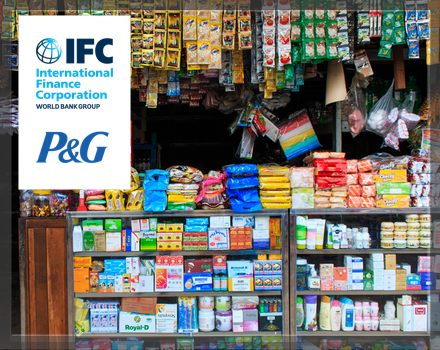Case Study: Enabling Trade Credit for Indonesia’s Traditional Retail Sector, IFC and P&G
Challenge
Indonesia’s traditional retail sector represents the backbone of consumer goods distribution across the country. These small, often family-run businesses typically operate in cash, lack formal credit histories, and have limited or no access to bank financing. In contrast, manufacturers and their distribution partners are well-banked and data-rich. This structural gap restricts trade credit and inventory liquidity for retailers—constraining both growth and supply chain efficiency.
IFC sought to explore how digital trade data could be leveraged to unlock working capital for unbanked retailers—without requiring disruptive onboarding or formal financial histories.
Approach
Factfin was engaged to work directly with P&G and its eastern Indonesian distribution partner, Borwita, to investigate the feasibility of digitally-enabled trade credit. Factfin co-developed an MVP trade credit product with Borwita and P&G, focused on delivering a core solution quickly and iteratively:
Data Analysis
Aggregated Borwita’s historical sales records to traditional retailers.
Identified key behaviours: order consistency, volumes, and payment history.
Prototype Credit Scoring Model
Designed a statistical model using sales frequency, seasonality, and purchase-to-payment lag.
Scored retailers based solely on supply chain engagement, sidestepping formal credit checks.
Trade Credit MVP
Implemented a simple trade credit structure: approved retailers could defer payments for inventory.
Fast credit allocation based on computed score thresholds.
Pilot Execution
Onboarded selected retailers into the program.
Tracked purchase volume, SKU mix, and repayment behaviour over the pilot duration.
Outcomes
Trade Credit Adoption: Retailers in the pilot increased their purchasing volumes of P&G products, using the new credit facility to manage cash flow more efficiently.
Sales Growth: Participating retailers showed measurable uplift in order size and frequency, benefiting both distributor and manufacturer.
Data-Driven Lending Framework: Provided IFC and partners with a replicable model for trade-based credit assessment that can be scaled to similar FMCG supply chains across emerging markets.
Strategic Insight for IFC: Demonstrated how private sector sales data can be used to extend credit access to the unbanked, aligning with broader financial inclusion goals.
Deliverables
Sales data ingestion and cleansing
Retailer segmentation and scoring algorithm development
Trade credit product design and score-based credit criteria
Pilot implementation and program evaluation
Financial and supply chain impact measurements
Lessons Learned
Trust & Familiarity Matter: Retailers were more comfortable accepting credit from a known distributor than from a formal bank.
Data is Credit: Operational sales data is a powerful proxy for creditworthiness in the absence of traditional financial records.
Embedded Finance Wins: Credit products embedded within the supply chain can outperform standalone SME lending offerings.
Strategic Impacts
Distributed trade data, rather than personal credit histories, can underpin credit scoring for informal retail—a novel use of embedded data.
Positioning P&G and Borwita as trade lenders reinforces their supply chain influence and may reduce defaults.
This model advances IFC’s broader goals of financial inclusion and B2B digital payments, especially across informal ecosystems.


